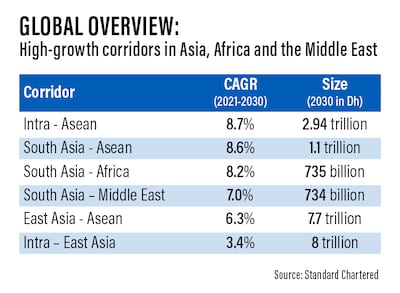The UAE's exports are projected to reach Dh2 trillion ($545 billion) by 2030, with trade growing faster than the global average as the Emirates focuses on developing new trade corridors and diversifying its exports.
The country's exports are projected to increase by 5.5 per cent annually, with metals and minerals (accounting for 73 per cent of exports by 2030) and plastics and rubbers set to drive growth, Standard Chartered said in a report on Thursday.
The projection is higher than the bank's previous estimate of the UAE's exports reaching Dh1.1 trillion by 2030.
Meanwhile, the global trade industry is expected to reach Dh120 trillion by 2030, with a projected growth rate of 5 per cent, it said.
The UAE government’s “long-standing open trade regime, commitment to high-quality infrastructure and business-friendly policies have shaped this market into the leading hub for trade, finance and commerce in the Middle East”, Standard Chartered said.
The UAE aims to deepen trade and investment ties with fast-growing economies in Asia, Africa and the Middle East, attract $150 billion in foreign investment into its domestic non-oil industries and diversify its export profile.
“The UAE's success in diversifying its exports along with the development of new trade corridors positions the country favourably for sustained growth and reinforces its economic resilience,” said Rola Abu Manneh, chief executive of Standard Chartered UAE.
“This achievement is a direct result of the government’s dedicated efforts to facilitating cross-border trade.”
The UAE's goods trade with the rest of the world hit $1.02 trillion in 2022, with exports and imports increasing due to higher crude oil prices, according to the World Trade Organisation's Global Trade Outlook and Statistics report released in April.
The UAE accounted for 2.4 per cent of the world's goods exports last year, the WTO said.
The value of its exports reached $599 billion last year, an annual growth of 41 per cent, while imports hit $425 billion, accounting for 1.7 per cent of global merchandise imports.
The UAE was ranked 11th in the world among the top commodity-exporting countries, the report found.
The country's non-oil foreign trade rose 17 per cent annually to hit a record Dh2.23 trillion last year as the Emirates put in place measures to diversify its economy and boost its economic partnerships, according to official figures.
The country is working towards signing 26 comprehensive economic partnership agreements, Abdulla bin Touq, Minister of Economy, said in March.
It aims to eliminate unnecessary trade barriers, increase market access and set up investment and trade ventures with its partners.
The country has already signed Cepas with India, Israel, Indonesia and Turkey, and is close to finalising agreements with Kenya, Cambodia and Georgia.
The UAE also started Cepa talks with Costa Rica, Thailand and Vietnam. Last week, the UAE and Malaysia agreed to start Cepa negotiations.
UAE exporters can reach “more than 2.2 billion consumers today, thanks to new trade agreements with some of the world’s fastest-growing economies”, Minister of State for Foreign Trade Dr Thani Al Zeyoudi said at the Make it in the Emirates forum in Abu Dhabi this week.
He said Cepas could contribute to more than 2.6 per cent of national gross domestic product by 2031.
“This will grow further, with the Emirates poised to sign a string of new deals this year,” he told delegates.
The UAE's foreign trade agenda is part of the nation’s growth strategy that seeks to double the size of the economy to $762 billion by 2030.

Meanwhile, Dubai's D33 economic agenda, which aims to double the size of its economy with a target of reaching Dh32 trillion by 2033, also aims to double the size of the emirate’s foreign trade and add 400 cities to its foreign trade map in the next decade.
The Dubai government has also launched the World Logistics Passport – an international freight loyalty programme that connects local manufacturers, freight forwarders and traders, to create an interconnected trading and logistics network.
“These pushes for deeper trade integration are expected to further solidify the UAE’s position as the Middle East’s gateway to the world,” Standard Chartered said.
India is set to remain the UAE’s largest export destination while exports to Turkey, Vietnam and Singapore are among the fastest growing, the report found.
chief executive of Standard Chartered UAE
“Driven by the government's … commitment to facilitating cross-border trade, the UAE is undergoing substantial capacity expansions in critical industries. Notably, the country has achieved an impressive export diversity ratio of 0.54 per cent, surpassing the global average,” the report stated.
This is due to the country’s efforts in diversifying exports into non-oil sectors through measures to relax foreign ownership rules and offer attractive incentives, it said.

Overall, the report also found that trade corridors anchored in Asia, Africa and the Middle East are expected to outpace global trade growth rate by about four percentage points, propelling the combined trade volume in these regions to Dh53 trillion, or 44 per cent of global trade by 2030.
“The favourable fundamentals in Asia, Africa and the Middle East need the right policies to enable growth outcomes. These regions are at once competitive manufacturing hubs for exports and, with rising incomes, valuable consumer markets of the future,” the report said.
“Policies that support the development of infrastructure, trade co-operation and key industries will be pivotal in the regions’ growth story.”
The report also stressed that the greater adoption of digital supply chain finance solutions could greatly improve supply chain resilience and environment, social and governance compliance to make global trade more sustainable, inclusive and transparent.


